Q&A with Brett Sobieraski: Sheriff candidate says he can take the Sheriff’s Office to a higher level
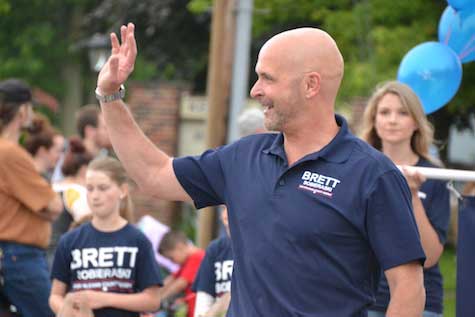
Photos by Tom Rivers: Brett Sobieraski waves to the crowd while walking in the Kendall Carnival Parade on Thursday.
Brett Sobieraski, a Kent resident, is running in the Republican Primary on Tuesday for sheriff against Chris Bourke, the current undersheriff.
Sobieraski, 52, is a sergeant in the Rochester Police Department. He started his career in Lockport and worked there for four years. He grew up in Lockport, where his late father John was a detective. His uncle also worked for the Lockport PD and Sobieraski’s cousin is a police officer for Lockport.
Sobieraski’s son Zachary, a Kendall graduate, is a Rochester police officer and his other son Gabriel works for the Postal Service in Henrietta.
Sobieraski joined the RPD about 26 years ago. He supervises the Greater Rochester Area Narcotics Enforcement Team and is a team leader on the SWAT Team. Sobieraski also is an instructor at the Monroe County Law Enforcement Academy.
He has lived in Kent the past 27 years.
The following interview with Sobieraski was conducted by Orleans Hub edtor Tom Rivers on June 4 at Hoag Library in Albion.
Question: Why do you like being a police officer?
Sobieraski: My big influence was my father who was a police officer. I always looked up to him. He would take me around to the police department when I was younger and visit the guys. I think that’s when it really got in my blood. I never remember not wanting to be anything other than a police officer my entire life.
At certain times maybe I wanted to go into the FBI or be a homicide detective, but I always wanted to be a police officer for many different reasons. One of them, with my mom and dad, I’ve always had a very strong moral compass. Even when I was younger if I saw people cheating at school or sports, it always upset me because it wasn’t right.
When I became a police officer, it was the greatest job ever. Part of it is the action and the excitement of it. I would never say it’s not. The job I have now, executing search warrants, whether regular narcotics or on the SWAT team, it’s an exciting job. You can see a difference with these drug investigations where people get their neighborhoods back, even if it’s just for a day or two. They get some peace in their neighborhood when we take out these drug houses.
I’m a year away from maximum retirement, not age, but I’ll have 32 years in the system. Initially that was my plan to work until 2020 and then figure out the next part of my life. I still feel like I have so much horsepower to give. I still love to go to work. Ninety percent of the time I go to work and I can’t believe they pay me what they do.
Question: So why not stay in that role, seeing that you like it so much and I know you’re well regarded?
Sobieraski: This was not in my plans, but then I would run into folks at the law enforcement academy from folks that work out here, and not just from inside the Sheriff’s Department but the adjoining village police departments, and the state police. They would relay to me the issues that are out here mostly stem from leadership or the lack thereof, and the way they have been doing business out here forever.
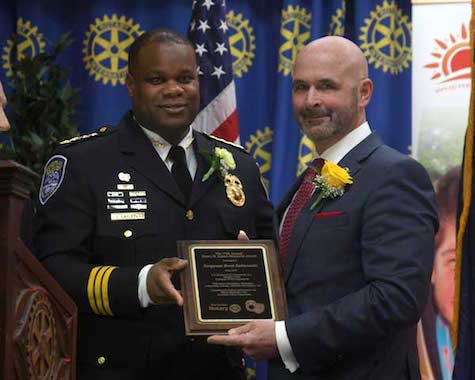
Photo courtesy of Tom Smith: Rochester Police Chief La’Ron Singletary presents an award on May 7 to Brett Sobieraski. He received the Rochester Rotary Club’s Henry H. Jensen Memorial Award, the highest community award presented to a Rochester police officer.
I would get phone calls from people inside the organization. I would get phone calls from citizens. Most of it dealt with, “This is Orleans County and this is the way we’ve always done it.”
I’ve talked with police officers who have come out here and worked at other jurisdictions. They get here and they ask, “Where are the General Orders?” The General Orders in any department govern how you do business in the day in and day out, whether it’s property or vehicle stops, or arrest procedures or juvenile procedures. They come up to this office and they ask where the General Orders are and they say, “We don’t have them. We don’t know where they are at.”
You just learn from other folks, which is malfeasance at the best. Just the philosophy that there’s not much expectations from the leadership out here. I’ve said it’s not a deputy problem, it’s a leadership problem.
The policemen out here want to do the right thing. The folks who work in the jail, the dispatchers want to do the right thing, but when there is no expectation of doing the right thing or being great, then you just kind of do what you want to do.
What I want to do is stop the A Team and B Team out here and make it one team.
Question: With the current leadership, I think some people would say they see successes, from getting deputies in the schools at Kendall and Lyndonville, grants for canal patrols, animal shelter improvements, and other projects. Do you think that’s the perception in the community, that there is a leadership problem?
Sobieraski: I don’t know if it’s the perception. If you don’t use the system you may not know how broke it is. Part of it is a law enforcement agency, with true law enforcement. If you look at the Pennysaver with their monthly stats, where are the law enforcement stats? Where are the number of DWIs?
Their STOP-DWI funding dropped by 29 percent from 2018 to 2019. Where are the stats? When you don’t have the stats, you don’t put them out. We have the most unsafe roads in the entire state because of serious physical injury accidents and fatal accidents and everyone wants to point to the deer. In 2017, not one deer collision caused a fatality or a serious accident. Because there is no traffic enforcement. That is leadership at the top. That’s why we have unsafe roads.
When you talk to your village chiefs, ask how often there is communication between them and the Sheriff’s Office administration. Those bridges have all been burned, partly because of that consolidation study which started very apolitical, and then because of power-mongering and empire build, it turned very political out of the Sheriff’s Office.
What you have is fragmented law enforcement across the board out here.
‘I’ve been a leader for 22 years. I made the mistakes and I learned from them. The worst thing you can bring into a place is an ego because it immediately is going to turn everyone off and then no one wants to work with that person.’
If you really dove down deep into what the Sheriff’s Office is now, with the injection of all the politics in this last campaign cycle, where again the undersheriff, a road sergeant, a road investigator, all of sudden get put on committees, and committees where they don’t even live in the jurisdiction, just to secure a nomination for the incumbent sheriff. The proposed undersheriff is now the vice chairman (for the Orleans County Republican Party). All of this gets ejected into there and it causes that place to be dysfunctional.
You had a true politician enter in as the sheriff and then with that came all the politics that followed. As opposed to having a real law enforcement leader with a law enforcement leadership background.
Question: With the Task Force, you do hear rumblings that it should be under the Sheriff’s Office, rather than being run out of the District Attorney’s Office. Would you push to have the Task Force be run through the Sheriff’s Office?
Sobieraski: It was initially under the Sheriff’s Department, and then sometimes in the early 2000s, it basically went defunct. There were issues with the municipalities. That was when Albion, Medina and Holley all gave a person.
The Sheriff’s Office had big control of it. And then it just went under. As to why, there are many different reasons. And then when it went under, Joe Cardone, the DA, resurrected it, and put it under his office. If he didn’t do that it wouldn’t exist out here. When you think about it, not having a Drug Task Force in the middle of the largest public health crisis we’ll see with the opiate epidemic, it would be disastrous.
He ended up rebuilding it. It’s definitely a bone of contention. Folks don’t feel it should be in the District Attorney’s office. But when it really comes down to it the funding is approved by the County Legislature. They ultimately decide where it lies and right now it lies in the District Attorney’s Office.
So what I tell people is the current sheriff has been trying to wrestle control of that over the last 3 ½ years and has been unable to do so. What that has resulted in is politics in front of people’s lives, which I’ll never do.
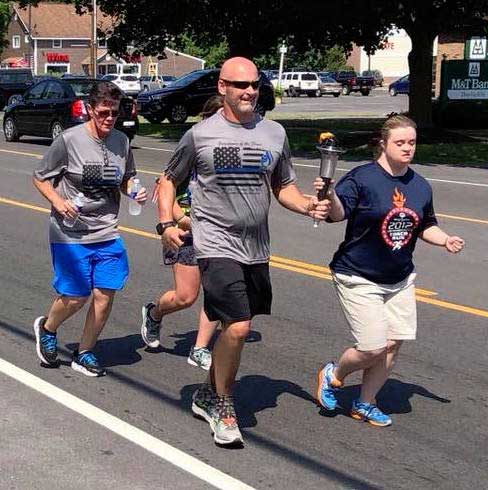
Provided photo: Brett Sobieraski runs the final stretch of a 50-hour journey on July 15, 2018, carrying a torch for the Special Olympics. He started in Buffalo on July 11 and would run more than 6 1/2 consecutive marathons in six different counties. He finished the challenge at the State Police Trooper Barracks in Elbridge, a town in Onondaga County, west of Syracuse. He has completing several endurance challenges to raise money for the Special Olympics, veterans and police officers.
So the current administration, they don’t work with the Drug Task Force. They don’t have a person assigned to the Drug Task Force. There is no flow of information.
I want to work with them. In the end if the Legislature sees my style of leadership – and I’ve run a Drug Task Force for almost 20 years – and then want to have some hybrid and go back to some kind of council overseeing it, and if they want to put it in the Sheriff’s Office, that’s fine. But what I’m never going to do is try to wrestle that away, because let’s face it the incumbent sheriff has tried for 3 ½ years and he couldn’t do it, and he’s as political as they get.
My plan is to be apolitical. I want to work with the Legislature. But in the middle of an opioid epidemic, I’m not going to play politics and not work with those folks. It’s almost criminal to not work with them with the amount of fatal and non-fatal overdoses we’re having in this county.
Question: People wonder who you would make your undersheriff. Can you talk about that?
Sobieraski: Absolutely, I get questions about who it is. My whole plan is once I win I want to interview internal candidates first. The reason I can’t interview internal candidates now is it would risk, minimally, their careers and jobs, should I not win.
If I go in and start interviewing people what would happen if someone jumped in on my ticket and I lost? They would be blackballed forever.
I’m going to wait until I win. I’m going to interview internal candidates and I’m going to interview external candidates. I’m going to pick the person, the guy or gal whose beliefs most line up with mine and who is brave enough to tell me when I’m wrong.
The only thing I will guarantee is it will be a person from Orleans County. There is a rumor out there that I’m going to bring a city guy in as the undersheriff. That is completely false.
Question: Has being on the campaign trail made you want to be sheriff even more?
Sobieraski: It has. I don’t like the politics part of it. I’ve seen a very dysfunctional side, I’ve seen a very nasty side so far, with innuendos, lies and stuff not based in facts put on social media against me.
But what I’ve done is meet so many great people. You kind of go in, thinking you know what folks want and what their needs are and what are their expectations.
Then you talk to folks and you’re like oh my gosh that’s not it. That’s what’s really been informative, meeting all of these people. I’ve been to over a hundred different events, taking to folks. I like me less talking and me more listening to what they expect from their Sheriff’s Office and how they want their community to be.
They all talk about safety. They all talk about sense of community and how this county is so great. That’s why I stay here when I could have moved to six other counties.
When someone is ill or in need, this community rallies like no other community I’ve seen, and it’s great. But I think with most people what we talk about is guarding what we have now. It’s the broken window theory, so we don’t become like other maybe urban areas that end up with decay. It could happen out here. And to think it couldn’t we’re not facing reality.
We have to work hard. If we work hard in law enforcement and we all become unified, which is my goal, then we could definitely maintain and make our county safer than it ever has.
So meeting folks is the greatest part. I love talking to folks and meeting them, and hearing their concerns.
Question: What are some of the concerns people share with you?
Sobieraski: One of them is animal control. We all know pets are like family, especially out here. I feel like everyone has a dog. That is one that came up that wasn’t on my radar. I started talking to folks and they said they would call about a stray dog and no one would come out until the morning. They said to either tie it up, bring it into your house or let it go. This kept coming up.
I heard someone say there was a dangerous dog outside by their house and their kid couldn’t go to school in the morning because they (animal control) weren’t going to come until business hours.
This has to change. The way I see it is if you find a stray, and it’s a friendly stray that shows up outside your door, then you call a deputy. If I can put a bad guy in the back of a car I bet I can put a friendly dog inside a car and take it to a shelter so it can be reunited.
If it’s a dangerous dog, who wants a dangerous dog roaming around? So we’re going to call our animal control people. That is one that really broadsided me.
It was a result of the consolidation study. It was all consolidated under the Sheriff’s Office. Back when it was under the villages, they had their own people. It was 24-7, you called them and they came.
You would think animal control isn’t on the radar, well it is if it’s your dog.
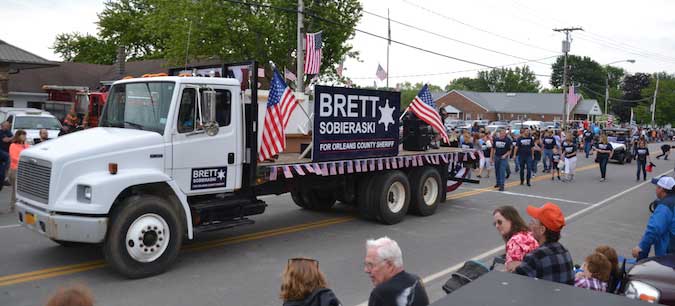
Some of Sobieraski’s supporters joined him in the Kendall parade on Thursday.
Question: So you’re saying the deputies could pick up a dog in some cases. If it’s a friendly dog they could just bring it to the shelter?
Sobieraski: They don’t because they’ve never done it before. You can’t be above that. You can’t be above helping a dog.
You have to look at things in a different lens and I think that is the biggest problem out here is the lens looking over the Sheriff’s Department is probably been the same for many, many years with very little outside influence. That department has become stale. It is not a 2019 department.
I don’t want to turn it into RPD. But what I want to do is take all the good things that I’ve learned there and all the leadership that I’ve acquired there between there, and the police academy and the SWAT team and bring it out here.
One of the examples that I talk about is I’m not going to go in there and turn everything upside down. You can’t make meaningful change by coming in like a whirlwind or a tornado. It’s going to be small, incremental changes. I’m going to keep the stuff that works.
We’re going to expand upon or do better programming. An example I talk about is awards. There is a process in the Sheriff’s Department to demote people, to fire people, to suspend people, to reprimand people. But they don’t have a policy for great behavior. That is unheard of. You can’t have one without the other. And in order to implement that first of all you have to care.
The second thing you have to do is know, to have some kind of knowledge of one. So out here, no awards. That’s going to be one of my first things because it’s low-hanging fruit, it’s easy to do.
Let’s craft a policy on different types of awards you could get, for everyone, whether you’re a road deputy, in corrections, you’re in dispatch, animal control, civilian. You make this criteria and then people, usually supervisors, but your peers can put you in. And then I’m not going to decide because I may be biased.
So you make a committee up and take someone out of corrections, someone from road patrol, take a civilian staff, take a dispatcher. Make a committee and they review the nominations.
I want to add that anything I propose in this county will not raises taxes or cost more money.
So for $2 I’m going to get these award bars like they do in the military. You see people in the military with all their bars on their chest. Those are awards and they can proudly wear it.
You have to recognize great behavior. It’s your duty as a leader to recognize it. Not to have it again is because it’s been looked at under the same lens and some of it is initiative based. It’s going to take a little bit of work to do it and you have to care to do it.
Question: And it might be fun.
Sobieraski: On my gosh, we just had it (at the RPD) and my son (Zachary), I’m so proud, he got a life-saving award. A young man got shot and Zachary had to put direct pressure on it because he couldn’t get a tourniquet on it because it was too high in the groin.
The young man got to the hospital, and modern medicine is awesome because he had almost no blood left in him, but they saved him. What a proud moment to see your son, your family member, up on the stage getting an award.
You give out these awards as they come and then once a year, you call Medina, Albion, the State Police and say we need you to cover for four hours because we’re all going to get together as a family and have an awards ceremony, and bring your families.
Question: It might be good to have the Orleans County law enforcement banquet and invite all the agencies, including Albion, Holley, Medina, State Police and the DEC.
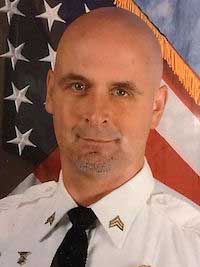
Brett Sobieraski
Sobieraski: How great would that be where we could recognize great behavior because it is going on out there and unfortunately it is going unrecognized.
Just the unity in local law enforcement out here, to include all of those entities and to meet once a month. I call it the law enforcement council. We’d around a table and talk about the issues that face us all because the issues are the same in Medina, Albion, Holley, Carlton, Barre, it’s all the same and we’ll get on the same page. We’ll understand them and attack them together.
The important part is we’ll train together and have a unified response. What that will do, besides better public safety, is save money.
When you think about it, the Sheriff’s Department right now no longer trains with the other agencies. So when they train, they need trainers. When you go to range and shoot, you need trainers. You end up taking your trainers off the road and that creates overtime because you have to backfill those spots.
What about if you all start training together and the Sheriff’s Department gives a person, and Medina gives a person, Albion gives a person and no one takes a big hit.
So it’s almost like consolidation. Nobody empties out their rank and file for a training day. Everyone gives a little and no one hurts a lot, and we all come together. That’s how you breed cohesiveness among the other agencies is sweat and toil together, shoulder to shoulder so when it really happens you’re shoulder to shoulder and respond in the same way.
Question: It seems like with the current sheriff some of the other law enforcement leaders haven’t really accepted him since day one?
Sobieraski: When you become a new boss there are certain learning curves. Part of being a new boss is you tend to be egotistical at times, you tend to think you’re rank is maybe too important. You can come in way too hard and way too high that you’re in charge of everyone else. That was part of it.
He would recruit officers from other villages. What you don’t do is fish in your pond. So some chiefs took exception to that. “Why are you recruiting my officers? I worked hard to get these folks here.” So go recruit somewhere else. So that was part of it and I think it was a lack of willingness to work together and to check ego at the door and realize that you are peers with the other chiefs. You’re not better than them just because you command 110 people and they command 15. You’re no more of a person, you’re no more of a leader than they are. I think that is really where the divide came over leadership style.
I got that all out of my system. I’ve been a leader for 22 years. I made the mistakes and I learned from them. The worst thing you can bring into a place is an ego because it immediately is going to turn everyone off and then no one wants to work with that person.
‘You have to look at things in a different lens and I think that is the biggest problem out here is the lens looking over the Sheriff’s Department is probably been the same for many, many years with very little outside influence. That department has become stale. It is not a 2019 department.’
Question: I know you’re involved in many community efforts, with the Special Olympics and the Luther Doyle recovery group. Do you have anticipate being involved in community causes here outside of the Sheriff’s Office?
Sobieraski: I will have a bully pulpit to advocate for causes that I find near and dear to my heart that the community will – for recovery, for GCASA, for Orleans – Recovery Hope Begins Here, for United Way.
RPD, we give a lot of money to the United Way because of the way they structure their campaigns towards law enforcement. I want to bring that here to our United Way. We’re going to raise a lot of money for United Way which goes to great causes. The money stays in Orleans.
I see it as a big bully pulpit to make meaningful social changes also. I’ve been doing it now for the last eight years. I’m not going to stop. I’m going to get behind the causes that are important in this community and I’m going to stay behind them. The benefit will not just be awareness it will be fundraising.
When we talk about awareness with this opiate epidemic, the more you talk about it, the more stigma gets erased and the less it becomes us versus them, or they deserve what they get, especially with opioids and the way people get addicted.
You got to have meaningful dialogue and I love going to Hope Recovery Begins and you hear the stories and the success stories of folks who are in active recovery and that it can happen. To think we are going to arrest our way out of this is ridiculous.
To just think you’re going to throw people in jail at $70 to $80 a day that we’re paying, and look at the associated crime. The people breaking in your houses and cars are drug addicts fueling their addiction.
Getting behind that cause would be priority number one, getting behind GCASA. I have an 18-year background in recovery (on the board of Luther Doyle). That is a huge part of pushing back this opioid epidemic.
I’m excited. There’s a lot I could do out here.
Question: Anything else you want to say?
Sobieraski: I’ve lived over half of my life here, for 27 years. I’m 52 years old. I understand the culture of Orleans County. I love the culture of Orleans County. That’s why I stay here. I have a vested interest in making Orleans County remain as safe as it can or safer than it’s ever been.
I’m sure over half the citizens of Orleans County drive somewhere else to go to work. It doesn’t make them any less citizens when they drove to Kodak or when they drove to Delco, and then came back here.
To say I don’t understand the culture out here, or I don’t understand rural or suburban police work is ridiculous, it really is.









































































